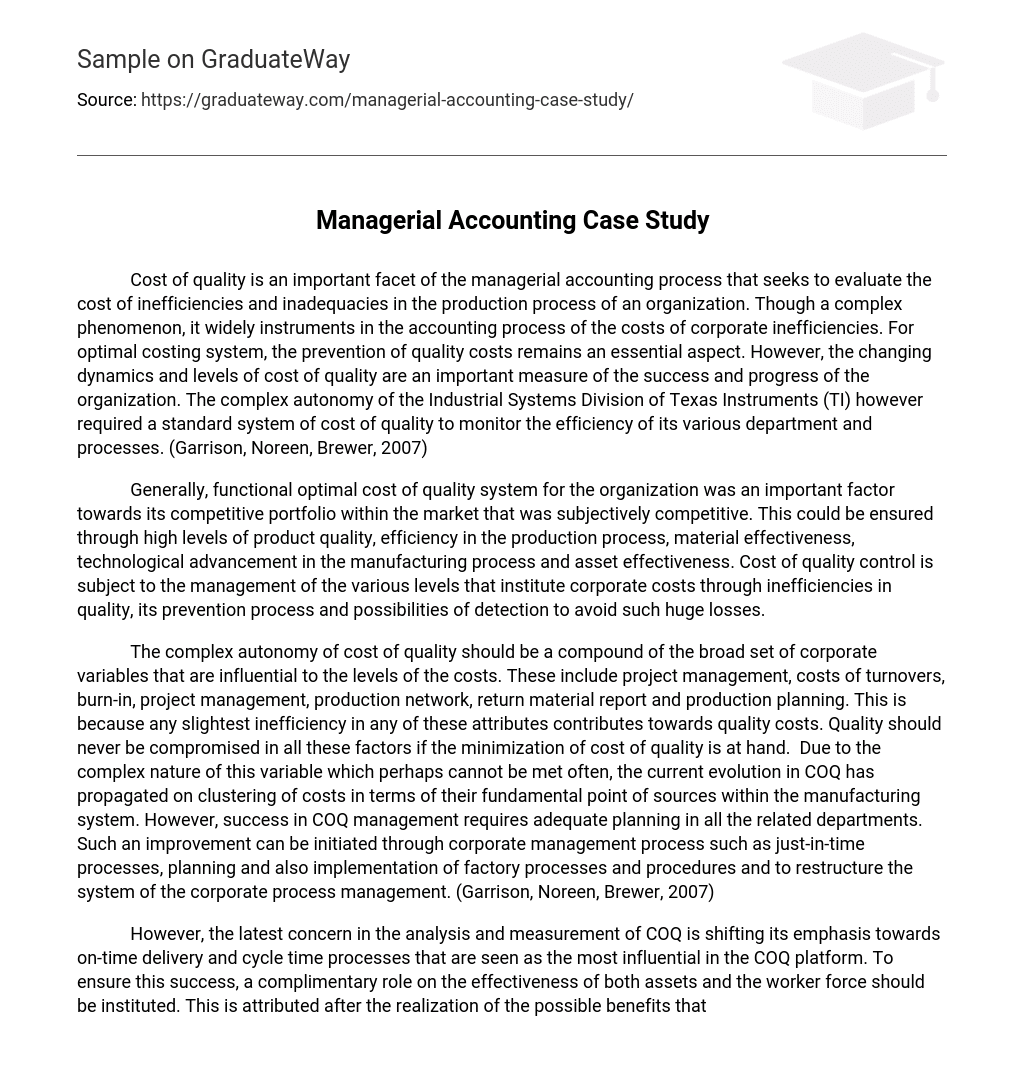Cost of quality is an important facet of the managerial accounting process that seeks to evaluate the cost of inefficiencies and inadequacies in the production process of an organization. Though a complex phenomenon, it widely instruments in the accounting process of the costs of corporate inefficiencies. For optimal costing system, the prevention of quality costs remains an essential aspect. However, the changing dynamics and levels of cost of quality are an important measure of the success and progress of the organization. The complex autonomy of the Industrial Systems Division of Texas Instruments (TI) however required a standard system of cost of quality to monitor the efficiency of its various department and processes. (Garrison, Noreen, Brewer, 2007)
Generally, functional optimal cost of quality system for the organization was an important factor towards its competitive portfolio within the market that was subjectively competitive. This could be ensured through high levels of product quality, efficiency in the production process, material effectiveness, technological advancement in the manufacturing process and asset effectiveness. Cost of quality control is subject to the management of the various levels that institute corporate costs through inefficiencies in quality, its prevention process and possibilities of detection to avoid such huge losses.
The complex autonomy of cost of quality should be a compound of the broad set of corporate variables that are influential to the levels of the costs. These include project management, costs of turnovers, burn-in, project management, production network, return material report and production planning. This is because any slightest inefficiency in any of these attributes contributes towards quality costs. Quality should never be compromised in all these factors if the minimization of cost of quality is at hand. Due to the complex nature of this variable which perhaps cannot be met often, the current evolution in COQ has propagated on clustering of costs in terms of their fundamental point of sources within the manufacturing system. However, success in COQ management requires adequate planning in all the related departments. Such an improvement can be initiated through corporate management process such as just-in-time processes, planning and also implementation of factory processes and procedures and to restructure the system of the corporate process management. (Garrison, Noreen, Brewer, 2007)
However, the latest concern in the analysis and measurement of COQ is shifting its emphasis towards on-time delivery and cycle time processes that are seen as the most influential in the COQ platform. To ensure this success, a complimentary role on the effectiveness of both assets and the worker force should be instituted. This is attributed after the realization of the possible benefits that could be reaped from the efficiencies in both corporate assets and the employees. Efficiencies in the manufacturing processes can therefore be the foremost attribute towards a well establishing cost saving manufacturing system. It is of great importance that costs that are related to the COQ are grouped in terms of either fixed or direct costs. Each category should be as minimal as possible. However, highest level of production ensures the least ratio of fixed costs. Variable costs can be minimized through corporate efficiencies in the manufacturing process. Since cost of quality is an important facet of the managerial process, adequate process management tools should be employed to help in minimizing such costs. The competitive portfolio of the organization demands that cost of quality be as minimal as possible which can be provided by efficiencies in all aspects that dictate the quality of the manufacturing process (Garrison, Noreen, Brewer, 2007)
Reference
Garrison, R, Noreen, E & Brewer, P (2007) Managerial Accounting. London, McGraw-Hill/Irwin





